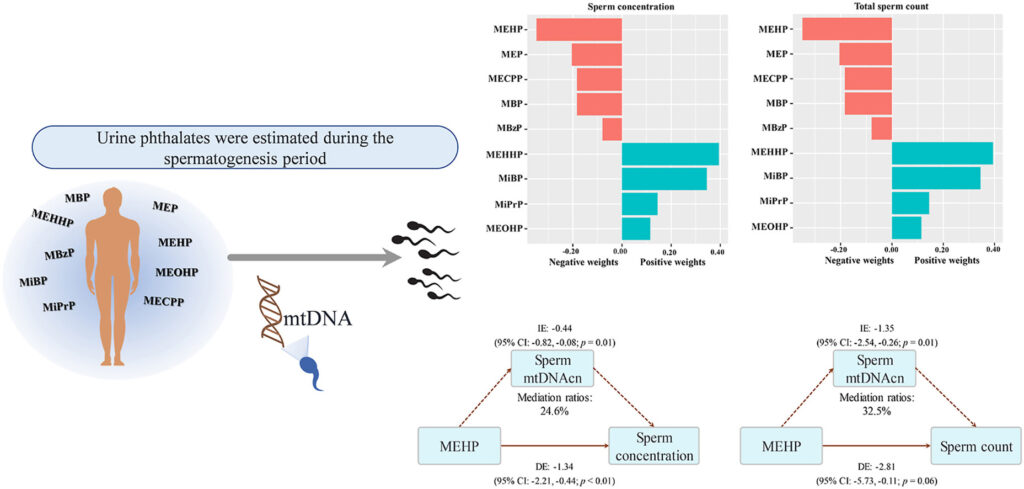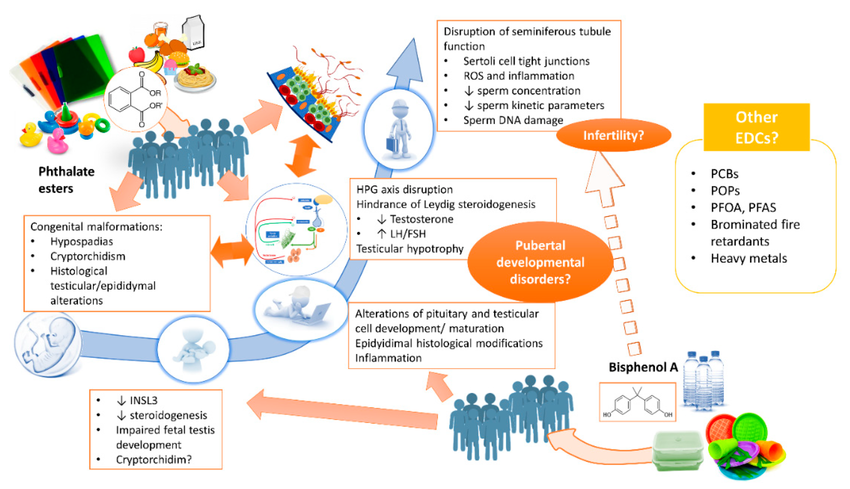You know that fresh, clean scent of your favorite cologne? The crisp linen smell of your detergent? The warm vanilla candle burning in your living room? Well, your hormones don’t find them nearly as appealing as your nose does. In fact, synthetic fragrances are quietly hijacking your endocrine system and wreaking havoc on everything from testosterone production to sperm count.
We live in a world where smelling good has become an expectation, but at what cost? The problem is, synthetic fragrances aren’t just about a pleasant aroma—they’re a cocktail of undisclosed chemicals that disrupt your body’s natural hormone balance. It’s time to dive deep into the toxic world of artificial scents and why you should be making some serious swaps ASAP.
What Are Endocrine Disruptors?
The endocrine system is your body’s internal command center for hormones, regulating everything from metabolism to mood, muscle growth, and reproductive health. Endocrine disruptors are chemicals that interfere with this delicate system, often mimicking or blocking natural hormones like testosterone and estrogen.
One of the biggest offenders? Phthalates—a class of chemicals commonly found in synthetic fragrances. These little hormonal saboteurs make scents last longer, but they also mimic estrogen, block testosterone, and mess with fertility. And phthalates are just the tip of the iceberg.
How Synthetic Fragrances Attack Your Hormones
Synthetic fragrances are a chemical soup that often contains:
Phthalates: Known to lower testosterone and harm sperm quality
Parabens: Artificial preservatives that mimic estrogen and disrupt the endocrine system
Synthetic Musks: Found in colognes and detergents, these compounds accumulate in fat tissue and disrupt hormone signaling
Benzene Derivatives: Some of these are classified as carcinogens
Volatile Organic Compounds (VOCs): Released into the air by air fresheners, plug-ins, and scented candles, VOCs contribute to indoor air pollution and respiratory issues
The real kicker? Manufacturers don’t have to disclose all the chemicals hiding under the vague label of “fragrance.” So when you see that word on a bottle, consider it a red flag for a potential hormonal disaster.
The Testosterone Killer
If you care about maintaining healthy testosterone levels, synthetic fragrances should be on your enemy list. Testosterone is crucial for everything from muscle growth to energy levels, mood stability, and fertility. Yet, phthalates—one of the most common synthetic fragrance ingredients—have been directly linked to lower testosterone levels in multiple studies.
A study published in Environmental Health Perspectives found that men with higher phthalate exposure had significantly lower testosterone levels and sperm quality. Another study published in Human Reproduction showed that phthalates not only reduce testosterone but also negatively affect testicular function. In other words, spraying on that designer cologne daily might be slowly neutering you.
The Link Between Testosterone and Masculinity
Testosterone is more than just a sex hormone—it’s what makes men, men. It influences muscle mass, bone density, energy levels, focus, and even competitiveness. When testosterone levels dip, so do many aspects of what men consider their peak physical and mental performance.
Symptoms of low testosterone due to endocrine disruptors like synthetic fragrances include:
Decreased muscle mass and strength
Increased body fat (especially around the midsection)
Reduced energy levels and chronic fatigue
Brain fog and difficulty concentrating
Lower libido and erectile dysfunction
Mood swings, depression, and increased irritability
How Synthetic Fragrances Wreck Your Hormonal Balance
Phthalates and other endocrine disruptors interfere with the hypothalamic-pituitary-gonadal (HPG) axis, the system responsible for regulating testosterone production. When this axis is disrupted, the body’s ability to produce and maintain optimal testosterone levels is compromised.
The problem isn’t just cologne. Many everyday products men use—deodorants, shampoos, aftershaves, and laundry detergents—contain these chemicals, creating a constant, low-grade assault on the body’s endocrine system.
Several studies prove that synthetic fragrances are associated with reduced sperm quality, lower testosterone levels, and even increased risk of testicular atrophy over time. The effects start small but compound over years, leading to hormonal imbalances that become harder to correct naturally.
Synthetic Fragrances and Reproductive Health
The statistics on male fertility are alarming. Over the past 50 years, sperm counts have dropped by more than 50%, and exposure to endocrine-disrupting chemicals like those found in synthetic fragrances is a major contributor.
Phthalates, parabens, and most other fragrances have been shown to reduce sperm motility and count
Exposure in utero can alter reproductive organ development in male infants
Synthetic fragrance chemicals disrupt the hypothalamic-pituitary-gonadal (HPG) axis, a key regulator of reproductive function
Increased exposure is linked to higher rates of erectile dysfunction and lower libido
A 2022 meta-analysis found that men exposed to high levels of phthalates had significantly lower sperm concentration and motility. Several other studies confirmed that even low-dose, chronic exposure negatively impacts sperm morphology and DNA integrity, meaning these chemicals are literally corrupting your genetic material.
Beyond sperm health, synthetic fragrances have also been linked to prostate issues, testicular atrophy, and hormonal imbalances that contribute to sexual dysfunction. This isn’t just about fertility—this is about long-term male health and well-being.
Can You Reverse the Damage?
The good news? The body has an incredible ability to recover—if given the right tools. Here are some key ways to help restore testosterone levels after ditching synthetic fragrances:
Detox from Endocrine Disruptors – Start by eliminating synthetic fragrance sources from your environment. That means a full audit of your home—your colognes, deodorants, body washes, laundry detergents, and even dishwashing soap.
Purge the Plug-Ins – Have your wife throw out those scented candles, plug-in air fresheners, and room sprays. They’re some of the worst offenders for endocrine-disrupting chemicals.
Optimize Your Diet – Eat foods that support testosterone production, like grass-fed beef, eggs, wild-caught salmon, oysters, and cruciferous vegetables (broccoli, kale, Brussels sprouts).
Exercise Smartly – Heavy resistance training and high-intensity interval training (HIIT) have been shown to boost testosterone naturally.
Get More Sleep – Sleep is essential for hormone regulation. Aim for 7-9 hours per night, and eliminate blue light exposure before bed to maximize deep sleep.
Filter Your Home – Use an air purifier to remove VOCs and other chemicals lingering in the air.
Switch to Natural Personal Care Products – Instead of conventional colognes, deodorants, and soaps packed with hormone-disrupting chemicals, switch to natural alternatives. Brands like VanMan offer tallow-based soaps, deodorants, and other personal care products that won’t sabotage your endocrine system.
Detox Regularly, Especially Through Sweat – Your body naturally removes toxins through sweat, and one of the best ways to accelerate detox is through sauna use. The Firefly Spark Sauna Tent is an excellent option for deep detoxification, supporting hormone balance and overall vitality. Use code “TOTHEMOON” to save $200 on a Firefly Sauna.
True Vitality Smells Better Than Any Cologne
Here’s the hard truth: your scent is a direct reflection of your health. People who are loaded with toxins can’t put on enough deodorant to mask the smell. Their bodies are constantly trying to detox through sweat, and the result is often a distinct odor that no synthetic fragrance can truly cover up.
On the other hand, if you’re eating clean, detoxing regularly, exercising, and taking care of your gut health, chances are you smell just fine without artificial colognes and deodorants. Natural body scent, when not clogged with synthetic chemicals, is often subtle and even attractive.
If you’re relying on a chemical cocktail to smell “fresh,” it’s time to take a step back and ask: What am I covering up? The best way to smell good is to be a genuinely healthy, vital human. Prioritize detoxing, sweating, and nourishing your body, and your scent will take care of itself.
The Future: A Fragrance-Free World?
Just as we once thought smoking indoors was normal, our cultural obsession with synthetic fragrances will likely follow the same trajectory. More research is exposing the link between artificial scents and hormone disruption, and people are waking up to the dangers.
By switching to natural alternatives, you can reclaim control over your hormones, energy, and reproductive health. Make the change now—your future self will thank you.










